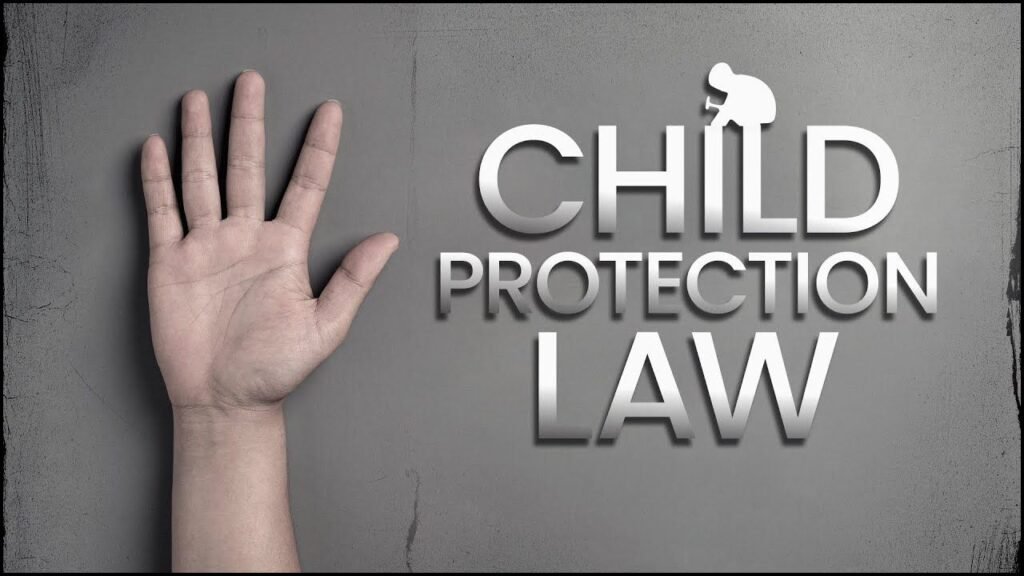
Child protection in India is supported by various laws created to safeguard the rights, dignity, and safety of children. A child is considered any person below the age of 18 years. The Constitution of India, along with specific acts and legal provisions, ensures that every child receives proper care, education, and protection from exploitation, abuse, and neglect.
Key Constitutional Provisions for Children
The Indian Constitution provides strong support for the rights of children.
- Article 15(3): Allows the government to make special laws for children.
- Article 21A: Guarantees free and compulsory education for children aged 6 to 14 years.
- Article 24: Prohibits child labour in hazardous employment.
- Article 39(e) and 39(f): Directs the State to ensure children are not abused and receive proper development.
Major Child Protection Laws in India
Several central laws focus directly on protecting children from various forms of harm.
1. Juvenile Justice (Care and Protection of Children) Act, 2015
- Purpose: Provides care, protection, rehabilitation, and legal support for children in conflict with the law and those in need of care.
- Main Features:
- Separate system for juveniles.
- Focus on reform and rehabilitation.
- Establishment of Child Welfare Committees (CWCs).
- Covers orphaned, neglected, and abused children.
2. Protection of Children from Sexual Offences (POCSO) Act, 2012
- Purpose: Prevents sexual abuse and sexual exploitation of children.
- Main Features:
- Defines different forms of sexual abuse clearly.
- Provides for child-friendly investigation and trial procedures.
- Mandates reporting of offences.
- Punishes those who fail to report abuse.
3. Child Labour (Prohibition and Regulation) Act, 1986 (Amended in 2016)
- Purpose: Prohibits the employment of children below 14 years and regulates working conditions for children aged 15 to 18.
- Main Features:
- Ban on the employment of children in any occupation.
- Light work is allowed in family businesses under certain conditions.
- Establishment of penalties for violations.
4. Right of Children to Free and Compulsory Education Act (RTE), 2009
- Purpose: Ensures every child between 6 and 14 years has the right to quality education.
- Main Features:
- No child can be held back or expelled till Class 8.
- Admission of disadvantaged children in private schools.
- Prohibition of physical punishment and mental harassment.
5. Prohibition of Child Marriage Act, 2006
- Purpose: Prevents child marriages and protects those already married as children.
- Main Features:
- Minimum age of marriage: 18 for girls and 21 for boys.
- Child marriage is voidable.
- Allows courts to provide protection and maintenance.
Child Welfare Bodies and Institutions
The government and judiciary have created various organisations to ensure the implementation of child laws.
| Body/Institution | Role and Responsibility |
|---|---|
| National Commission for Protection of Child Rights (NCPCR) | Monitors child rights and ensures effective implementation of laws. |
| Child Welfare Committee (CWC) | Deals with children in need of care and protection. |
| Juvenile Justice Board (JJB) | Handles cases involving children in conflict with the law. |
| State Commissions for Protection of Child Rights | Works at the state level to protect child rights. |
Important Government Schemes Supporting Child Protection
| Scheme Name | Objective |
|---|---|
| Integrated Child Protection Scheme (ICPS) | Offers care, protection, and rehabilitation services. |
| Beti Bachao Beti Padhao | Aims to stop female foeticide and promote girl child education. |
| Mid-Day Meal Scheme | Ensures nutritional meals for school children to promote health and retention. |
| Sukanya Samriddhi Yojana | Encourages saving for the education and marriage of girl children. |
Challenges in Child Protection
India faces many challenges in the field of child safety and protection.
- Lack of Awareness: Many parents and communities are unaware of child rights and laws.
- Poverty: Poor families often push children into labour or early marriage.
- Slow Legal Processes: Delays in justice discourage families from filing complaints.
- Underreporting of Abuse: Many cases of abuse go unreported due to fear or shame.
- Online Threats: The Increase in digital access has led to more cases of online exploitation.
Important Child Helpline Numbers
| Helpline Service | Number |
|---|---|
| Childline India | 1098 |
| Women Helpline | 181 |
| Cyber Crime Helpline | 1930 |
| Police Emergency | 100 |
Role of Schools and Teachers in Child Protection
Teachers and school staff play a vital role in identifying and reporting child abuse.
- Safe Environment: Schools must ensure safe and inclusive spaces.
- Training: Teachers should receive training on how to identify abuse signs.
- Counselling: Schools should have trained counsellors for emotional support.
- Reporting Mechanism: A clear system should exist to report and handle abuse cases.
Legal Punishments for Violating Child Protection Laws
| Offence | Punishment |
|---|---|
| Child sexual abuse (POCSO Act) | Imprisonment from 3 years to life, depending on severity |
| Employment of a child under 14 (Child Labour Act) | Fine up to Rs 50,000 and imprisonment up to 2 years |
| Conducting child marriage | Up to 2 years imprisonment and a fine up to Rs 1 lakh |
| Physical punishment in schools | Disciplinary action and possible imprisonment under the IPC |
Recent Updates and Initiatives
- National Education Policy (NEP) 2020: Emphasises inclusive and safe learning spaces for all children.
- Digital Safety Programs: Introduced to educate children about online dangers.
- Increased Budget Allocation: The Government has increased spending on child welfare and protection.
Wrapping Up
Child protection laws in India form a strong framework to defend the dignity and safety of every child. These laws are not only legal tools but also moral commitments of the nation toward its youngest citizens. Awareness, timely reporting, and collective responsibility from parents, teachers, and the government can ensure a safer environment for children across the country.
Essential Answers
Q1: What should one do if they witness child abuse?
A1: One should immediately call the 1098 Childline number or inform the nearest police station. Anonymous complaints are also accepted.
Q2: Is it mandatory for schools to report child abuse?
A2: Yes, under the POCSO Act, every school and its staff are legally bound to report any suspected or confirmed abuse.









